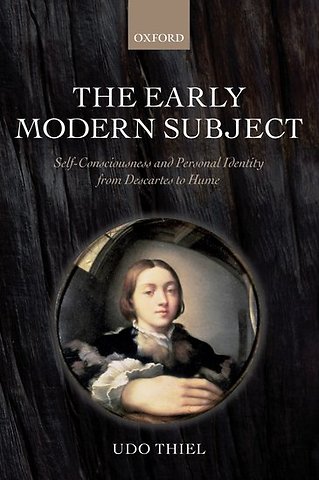The Early Modern Subject
Self-Consciousness and Personal Identity from Descartes to Hume
Paperback Engels 2014 9780198704409Samenvatting
The Early Modern Subject explores the understanding of self-consciousness and personal identity—two fundamental features of human subjectivity—as it developed in early modern philosophy. Udo Thiel presents a critical evaluation of these features as they were conceived in the seventeenth and eighteenth centuries.
He explains the arguments of thinkers such as Descartes, Locke, Leibniz, Wolff, and Hume, as well as their early critics, followers, and other philosophical contemporaries, and situates them within their historical contexts. Interest in the issues of self-consciousness and personal identity is in many ways characteristic and even central to early modern thought, but Thiel argues here that this is an interest that continues to this day, in a form still strongly influenced by the conceptual frameworks of early modern thought.
In this book he attempts to broaden the scope of the treatment of these issues considerably, covering more than a hundred years of philosophical debate in France, Britain, and Germany while remaining attentive to the details of the arguments under scrutiny and discussing alternative interpretations in many cases.
Specificaties
Lezersrecensies
Inhoudsopgave
INTRODUCTION: Aims and Issues
PART I: THE SEVENTEENTH-CENTURY BACKGROUND
1: The 'Ontological' View of the Self: Scholastic and Cartesian Conceptions
2: Metaphysical Alternatives. Conceptions of Identity, Morality, and the Afterlife
PART II: LOCKE'S SUBJECTIVIST REVOLUTION
3: Locke on Identity, Consciousness, and Self-Consciousness
4: Locke on Personal Identity: Consciousness, Memory, and Self-Concern
PART III: PROBLEMS WITH LOCKE. CRITIQUE AND DEFENCE
5: The Notion of a Person and the Role of Consciousness and Memory
6: The Charge of Circularity and the Argument from the Transitivity of Identity
PART IV: SUBJECTIVITY AND IMMATERIALIST METAPHYSICS OF THE MIND
7: The Soul, Human and Universal
8: Relating to the Soul and Pure Thought, Original Sin and the Afterlife
PART V: SUSBSTANCE, APPERCEPTION AND IDENTITY: LEIBNIZ, WOLFF, AND BEYOND
9: Individuation and Identity, Apperception and Consciousness in Leibniz and Wolff
10: Beyond Leibniz and Wolff. From Immortality to the Necessary "Unity of the Subject"
11: From the Critique of Wolffian Apperception to the Idea of the "Pre-existence" of Self-Consciousness
PART VI: BUNDLES AND SELVES: HUME IN CONTEXT
12: Hume and the Belief in Personal Identity
13: Hume and the Bundle View of the Self
CONCLUSION: BEYOND HUME AND WOLFF
BIBLIOGRAPHY
INDEX
Vaak samen gekocht
Anderen die dit boek kochten, kochten ook
Rubrieken
- advisering
- algemeen management
- coaching en trainen
- communicatie en media
- economie
- financieel management
- inkoop en logistiek
- internet en social media
- it-management / ict
- juridisch
- leiderschap
- marketing
- mens en maatschappij
- non-profit
- ondernemen
- organisatiekunde
- personal finance
- personeelsmanagement
- persoonlijke effectiviteit
- projectmanagement
- psychologie
- reclame en verkoop
- strategisch management
- verandermanagement
- werk en loopbaan








